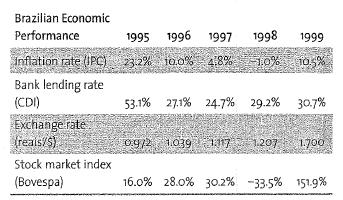6. The Tombs. You have joined your friends at the local watering hole, The Tombs, for your...
Question:
6. The Tombs. You have joined your friends at the local watering hole, The Tombs, for your weekly debate on international finance. The topic this week is whether the cost of equity can ever be cheaper than the cost of debt. The group has chosen Brazil in the mid-1990s as the subject of the debate. One of the group members has torn the following table of data out of Chapter 5 of this book, which is then the subject of the analysis.

Larry argues that "its all about expected versus delivered. You can talk about what equity investors expect, but they often find that what is delivered for years at a time is so small-even sometimes nega- tive-that in effect the cost of equity is cheaper than the cost of debt." Mohammed he goes by Mo-interrupts: "But you're missing the point. The cost of capital is what the investor requires in compensation for the risk taken going into the investment. If he doesn't end up getting it, and that was happening here, then he pulls his capital out and walks." Curly is the theoretician. "Ladies, this is not about empirical results; it is about the fundamental concept of risk-adjusted returns. An investor in equities knows he will reap returns only after all compensation has been made to debt-providers. He is there- fore always subject to a higher level of risk to his return than debt instruments, and as the capital asset pricing model states, equity investors set their expected returns as a risk-adjusted factor over and above the returns to risk-free instruments." At this point both Larry and Mo simply stared at Curly, paused, and both ordered another beer. Using the Brazilian data presented, comment on this week's debate at The Tombs.
Step by Step Answer:

Fundamentals Of Multinational Finance
ISBN: 9780321541642
3rd Edition
Authors: Michael H. Moffett, Arthur I. Stonehill, David K. Eiteman





